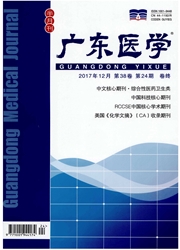

 中文摘要:
中文摘要:
目的探讨哺乳动物雷帕霉素靶蛋白(mammalian target of rapamycin,mTOR)在胃癌组织中的表达及其临床意义。方法采用逆转录聚合酶链反应和蛋白印迹检测30例胃癌组织及正常胃黏膜上皮组织中mTOR mRNA及蛋白的表达,并分析其表达与胃癌临床病理学特征的关系。结果 mTOR mRNA在胃癌组织中的阳性表达率和表达水平均显著高于正常胃黏膜上皮组织(P〈0.05),且mTOR mRNA的表达随分化程度的降低而显著增高(P〈0.05),有淋巴结转移者较无淋巴结转移者显著增高(P〈0.05)。mTOR蛋白在胃癌组织中的阳性表达率及相对表达值均显著高于正常胃黏膜上皮组织(P〈0.05),并且其在胃癌组织中的表达值随分化程度的降低而增高(P〈0.05),有淋巴结转移者较无淋巴结转移者mTOR蛋白的表达值显著增高(P〈0.05)。结论 mTOR的表达可能与胃癌的发生发展有关,其对判断胃癌的生物学行为具有一定的意义。
 英文摘要:
英文摘要:
Objective To investigate the clinical significance of mammalian target of rapamycin (roTOR) expression in gastric carcinoma. Methods: Reverse transcription - polymerase chain reaction and Western blot were used to assess roTOR mRNA and protein exp:ression in gastric carcinoma tissues from 30 cases and normal gastric epithelial tissues from 30 controls. The correlations between roTOR expression and clinicopathologic parameters of gastric carcinoma were analyzed. Results The positive rate and expression level of mTOR mRNA was significantly higher in gastric carcinoma tissues than those in normal gastric epithelium tissues (P 〈 0. 05 ). Furthermore, the expression of mTOR mRNA in gastric carcinoma was significantly positively correlated with tumor differentiation and lymph node metastasis ( P 〈 0. 05 ). And so was the expression of mTOR protein (P 〈 0.05). Conclusion The mTOR expression is associated pathogenesis of gastric carcinoma and can be applied for judging tumor biological behavior.
 同期刊论文项目
同期刊论文项目
 同项目期刊论文
同项目期刊论文
 期刊信息
期刊信息
